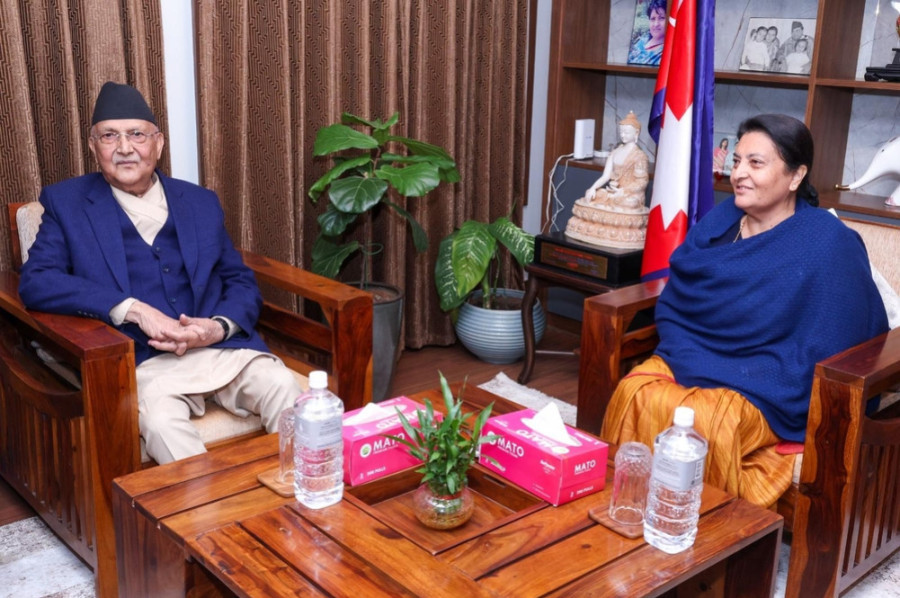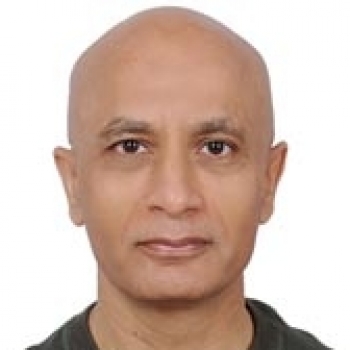Mon, Feb 16, 2026
Columns
Bhandari wrong, Oli more wrong
Oli needs to welcome Bhandari into the party and let the cadres decide on the next leader.
bookmark
Paban Raj Pandey
Published at : August 9, 2025
Updated at : August 10, 2025 19:15
It was wrong of former President Bidya Devi Bhandari to try to reenter politics after having relinquished party membership for eight years, but it was more wrong of Prime Minister KP Sharma Oli-led Communist Party of Nepal (Unified Marxist-Leninist) to nip Bhandari’s comeback bid in the bud. She served as the second president of Republic Nepal from 2015 to 2023. At the time of her appointment as president, she was serving as vice-chairperson of the UML, with Oli at the top. She renewed her UML membership one year ago, but this caused a stir only after she recently talked about her intention to return to active party politics. The UML central committee, in panic, has decided not to renew her membership.
Bhandari’s comeback attempt has apparently aroused fear among the top echelons of her mother party. Leaders like Ishwar Pokhrel, senior vice-chairman; Bishnu Paudel, vice-chairman and current finance minister; and Shankar Pokhrel, general secretary, are all hopefuls to succeed Oli. She began drawing most of the leadership’s ire as she began to hog the headlines. Her trip to China was followed by visits to districts including Jhapa, with the final nail in the coffin coming from a Television interview in which she hinted at her desire to vie for party leadership. Oli could have tried to stop her as soon as she renewed her membership a year ago, but she was obviously not perceived as a sound threat back then.
Oli is not in the mood to let go of the UML leadership. He is nearing completion of a second term as the party leader. The UML statute limits chairmanship to two terms. He is 73, and there is a 70-year age limit for holders of executive positions. A proposal to scrap the age bar and the term cap has already been floated. In next year’s general convention, these restrictions will probably be amended, opening the door to Oli’s continued rule. It is sad to see all this. Be it the UML, the Sher Bahadur Deuba-led Nepali Congress or the Pushpa Kamal Dahal-led CPN (Maoist Centre), the septuagenarians are not ready to pass the baton. In Nepali political leadership, there is no culture of grooming successors.
Ethics versus reality
Bhandari’s attempt to reenter active politics raises a major ethical question. Ideally, presidents, having occupied the nation’s topmost post, are better served spending the rest of their lives away from partisan politics. This is exactly the argument posited by Oli and his loyalists. They contend that Bhandari, post-presidency, has now become a national symbol and that her return will help endanger Nepal’s budding democracy. This is a lame excuse at best. Speaking of things not passing ethical muster, we currently have a government made up of the two largest parties; or take the May 2023 case of President Ramchandra Paudel signing the same citizenship bill that had been rejected by his predecessor Bhandari into law.
In defence of Bhandari, the 2015 Constitution does not bar her from returning to active politics; once out of office, the Chief Justice of the Supreme Court, in contrast, will not be eligible for appointment to any government office. In cases where the Constitution fails to specifically lay down the rules, there will be transgressions. Matrika Prasad Koirala, who served as prime minister for two separate terms in the early to mid-1950s, was later, in the 60s, appointed the ambassador to the US. Most recently, former vice-president Nanda Bahadur Pun (2015-23) has returned to active politics by rejoining the Maoist Centre as vice-chairman, rightfully raising questions as to whether Pun was earnestly non-partisan in his role as VP.
The same questions will be asked of Bhandari. How the president gets elected leaves plenty of room for doubt about whether they can ever be non-partisan when push comes to shove. An electoral college consisting of the directly elected members of both the houses of parliament and the elected members of state assemblies indirectly elects the president. By default, this ensures that the post goes to the party with the most seats. This also probably means giving up party membership is just a façade. Of several controversial decisions surrounding Bhandari’s presidency, the one that jumps out was when she twice rubber-stamped Oli’s unconstitutional dissolution of parliament in December 2020 and May 2021.
Change needed
Critics who argue that Bhandari was just a UML pawn as president are not completely wrong. But, truth be told, abuse of power is pervasive in Nepali politics. The political culture is rotten to the core. The Financial Action Task Force, a Paris-based anti-money laundering watchdog, in February did not put Nepal on its grey list for nothing. Corruption is widespread, and there is an acute lack of good governance. A day does not go by without a new scandal hitting the news. The three prominent leaders—Oli, Deuba and Dahal—are all implicated in scandals. If this is what is driving Bhandari to make a comeback, more power to her! A crusade against corruption is needed; Bhandari can fill that leadership vacuum.
Ahead, she has her work cut out for her. She is taking on a UML leadership that is not only worried about her rising popularity, but also because she is perceived to be soft towards the monarchy. Her late husband, Madan Bhandari, whose CPN (Marxist-Leninist) merged with the Man Mohan Adhikari-led CPN (Marxist) in 1991 to form the current UML, always thought there was room for a constitutional monarchy. People often talk about how former King Gyanendra attended the wedding of Bhandari’s youngest daughter in January 2017 and how Bhandari, in April that year, reciprocated by attending the bratabandha ritual of Hridayendra, Gyanendra’s grandson. Oli is firmly against reviving the monarchy.
King belongs to no party. This is why a growing number of people—fed up with the ongoing childish, partisan politics—are gravitating towards a system abolished in May 2008. The alternative is (a) to enact a system in which a non-partisan, non-political person is made president or (b) the current system continues but with enough maturity that partisan politicians, once in Shital Niwas, transition into non-partisan. Only then will Article 61 (3) of the Constitution, which states that the President shall promote the national unity of Nepal, be galvanised. In other words, a change is needed. Oli can begin by welcoming Bhandari into the party and letting the cadres decide on the next leader.
Most Read from Columns
Editor's Picks
E-PAPER | February 16, 2026
×




 15.12°C Kathmandu
15.12°C Kathmandu















